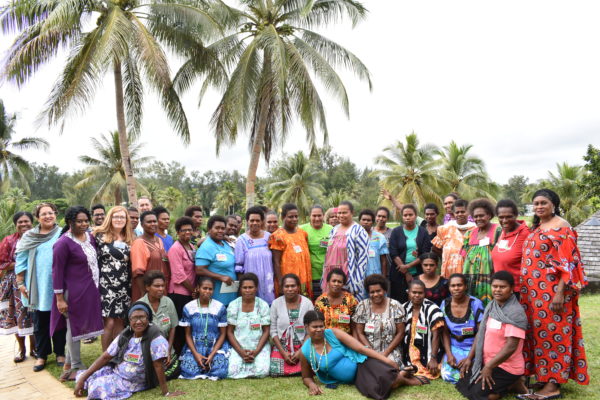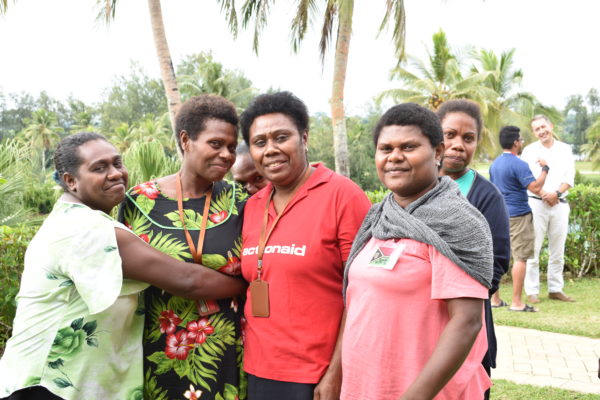On the 4th and 5th of July 2019, I had the honour of attending ActionAid’s National Women’s Convening: Women’s Leadership in Humanitarian Action in Port Vila, Vanuatu. I was invited as a guest to listen to the women and consider areas of potential law reform.
By way of background, ActionAid Australia is a member of the Plan Consortium and is the lead agency for the consortium in Vanuatu implementing the Disaster Ready Program funded by DFAT through the Australian Humanitarian Partnership Grant. The aim of their work in Vanuatu is to support diverse women’s leadership in strengthening community capacity in Disaster Risk Management and Comprehensive Protection Programming in Tanna, Erromango and Eton, where ActionAid already has a presence.
As part of this work, ActionAid, in collaboration with Women I Tok Tok Tugeta forum, co-hosted this Convening on Women’s Leadership and Humanitarian Action with the National Disaster Management Office (NDMO), the Department of Women’s Affairs and 70 community women leaders.

The purpose of the Convening was to provide an open space for direct dialogue and engagement between community women and government authorities, with a focus on exploring how women’s leadership can be better supported in times of crisis. The Convening also served to strengthen accountability by Government and humanitarian organisations to ensure that women’s leadership and gender responsive humanitarian action are core to any disaster planning or response, and that there is a common agenda established with commitments that can be monitored over time.
On the first of the two days, the women leaders consulted in groups and agreed areas of priorities and accountability for women’s leadership and gender responsive humanitarian action. This included a meaningful session with the Women with Disabilities Forum.
I was very moved listening to all of the women discuss how climate change and disasters are negatively impacting their lives. Some common themes that emerged included: death and family separation, significant damage to livelihood, houses, water and food and disturbance to education. Children are unable to attend school and there is damage to infrastructure including phones, leading to physical isolation and a lack of knowledge. Security is compromised and there is an increase in discrimination, poor health, and instances of family violence and drug and alcohol issues increase.
The women spoke passionately of their experiences in the wake of Cyclone Pam in 2015 – regarded as one of the worst natural disasters in the history of Vanuatu. Since Cyclone Pam there have been eight cyclones since, with climate change impacting normal weather patterns. As a result, their communities now face disaster after disaster, which is deeply affecting their lives.
The opportunities for women to provide leadership in preparing for, responding to and recovering from disasters were a key focus of the Convening. Women need to be more involved in the distribution of goods during disasters, and their needs must be included in response plans. Their knowledge is key to empowering women to speak out with confidence.

Ni Vanuatu women at the National Women’s Convening in Port Vila, Vanuatu
Technology, such as mobile phone alerts, allows communities to better prepare for extreme weather, and women need to be able to better store food, firewood, safe water and documents. Evacuation centres need to better care for women, children and people with disabilities, and women’s centres must organise more training for women to lead on addressing the issues affecting them and their children in their communities. A number of key areas of law reform were highlighted within these enriching discussions.
The women also discussed the challenges that women face in taking leadership and how they can look to overcome these challenges. They also considered how government and other stakeholders could better support them.
Key proposals put forward included:
- Evacuation centres that are aware of the needs of women, children and people with disabilities;
- Increased awareness and education about climate change;
- Livelihoods alternatives;
- Improved communication systems and infrastructure;
- Recognition of the voices, rights and dignity of women.
On the second day of the Convening, the women leaders fed back the above findings to key stakeholders including: the National Disaster Management Office (NDMO), the Department of Women’s Affairs, the Ministry of Climate Change, humanitarian actors and Parliamentarians.
I am so grateful to have had the opportunity to listen to these inspiring women about their lives, challenges and hopes for the future. Seeing the women become so empowered over the two days was unforgettable, and I look forward to working with them, ActionAid and other plan members to help develop areas of reform going forward.
Sarah Morton-Ramwell
Sarah is a partner and global head of pro bono and Corporate Responsibility (CR) at Ashurst. With a background in human rights, particularly, gender rights and reproductive rights, she works full time in pro bono and CR. Sarah started her career at the Center of Reproductive Rights and has worked at International Planned Parenthood Federation. Sarah sits on the Business Council of Australia’s Indigenous Engagement Taskforce, TrustLaw’s Council and is Chair of the International Bar Association’s Pro Bono Committee.
Find out more about our Gender Responsive Alternatives to Climate Change Project.